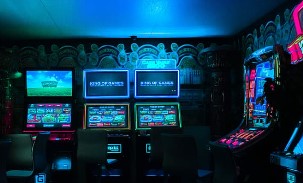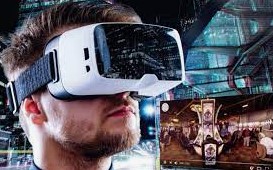

| TOP ONLINE CASINOS | |||||
| RANKING | CASINO | BONUS | BONUS | PLAY NOW | RATING |
1 | Exclusive Bonus Up to NZD$1000 + 100 Bonus Spins for $5! | $1000 |  |
||
2 | 4x deposit bonuses up to NZD$ 1,600 + 80 Bonus Spins for $1! | $1600 |  |
||
3 | $1000 |  |
|||
4 | $1200 |  |
|||
5 | $1500 |  |
|||
6 | Up to NZD $750 in Welcome Bonuses + 100 Free spins | $750 |  |
||
Virtual reality's foray into the world of casino gaming can be traced back to the early 2010s when a handful of developers began experimenting with the concept. As VR headsets like the Oculus Rift and HTC Vive gained traction, so did the idea of blending cutting-edge technology with traditional casino games. The result? A bold new frontier in gambling that sought to bridge the gap between the digital and the tangible.
Early VR casino experiences were rudimentary, featuring simplistic graphics and limited game selections. However, as VR technology evolved, so did the quality and variety of virtual casino offerings. Today, players can explore fully realized, interactive casino environments that boast many games, from slots and table games to live dealer experiences.
Modern VR casino gaming has come a long way since its humble beginnings. With the advent of more advanced VR headsets and increased processing power, developers have been able to create stunningly realistic virtual environments that transport players to the heart of the action.
 One of the most significant innovations in VR casino gaming is the live dealer experience. Players can interact with real-life dealers and other players in a virtual casino setting using VR technology. This adds a social aspect to the experience, replicating the camaraderie and excitement in land-based casinos. In addition, to live dealer games, VR casinos now offer a diverse range of gaming options. Players can immerse themselves in highly detailed slot games with captivating narratives and interactive bonus rounds. Likewise, table games like blackjack, roulette, and poker have been adapted to the virtual world, allowing players to engage in their favorite pastimes from their homes.
One of the most significant innovations in VR casino gaming is the live dealer experience. Players can interact with real-life dealers and other players in a virtual casino setting using VR technology. This adds a social aspect to the experience, replicating the camaraderie and excitement in land-based casinos. In addition, to live dealer games, VR casinos now offer a diverse range of gaming options. Players can immerse themselves in highly detailed slot games with captivating narratives and interactive bonus rounds. Likewise, table games like blackjack, roulette, and poker have been adapted to the virtual world, allowing players to engage in their favorite pastimes from their homes.
The rise of virtual reality in casino gaming offers several advantages over traditional online and land-based casinos. For one, it provides an unparalleled level of immersion. With a VR headset, players can experience a real casino's sights, sounds, and sensations without ever stepping outside their homes.
Moreover, VR casino gaming can be a more inclusive and accessible for players with mobility issues or living in areas without easy access to land-based casinos. Additionally, virtual reality casinos can provide a safer environment for gambling, as players can enjoy their favorite games without the distractions and temptations of a physical casino setting.
Furthermore, VR technology has the potential to enhance the overall gaming experience by incorporating unique features and gameplay mechanics that are not possible in traditional casino environments. For example, VR casinos can offer customizable avatars, allowing players to express their individuality and engage with others more personally.
While virtual reality has undoubtedly made significant strides in the casino gaming industry, challenges remain. Firstly, the cost of VR headsets and compatible hardware can be prohibitive for many potential players, limiting the technology's accessibility. Additionally, some players may experience motion sickness or discomfort while using VR headsets, which could deter them from fully embracing the medium.

Despite these challenges, the future of VR casino gaming looks incredibly promising. As technology advances, we can expect further graphics, interactivity, and game variety improvements. Furthermore, the growing adoption of 5G networks and advancements in cloud computing could reduce the need for expensive hardware, making VR casino gaming more accessible to a broader audience.
In addition to technological advancements, we may also see increased collaboration between VR casino developers and land-based casinos. This synergy could result in virtual reality experiences that are even more closely aligned with their real-world counterparts, providing players with an authentic and seamless transition between the two.
Another exciting prospect for the future of VR casino gaming lies in integrating other emerging technologies, such as augmented reality (AR) and artificial intelligence (AI). Combining these technologies could lead to more immersive and engaging experiences, blurring the lines between the physical and digital realms.
For example, imagine playing a VR poker game where AI-powered avatars mimic real opponents' body language and facial expressions, adding a layer of realism and strategy. Or envision an AR-enhanced VR casino experience where players can virtually "try on" different outfits and accessories, customizing their appearance in real time as they interact with other players and explore the casino floor.
As virtual reality continues to make its mark on the casino gaming industry, we can expect a significant shift in how people engage with and perceive gambling. With VR casinos offering an increasingly authentic and immersive experience, land-based casinos may need to adapt and innovate to remain competitive.
This could result in traditional casinos investing in VR technology, creating hybrid experiences that combine the best of both worlds. For instance, land-based casinos could offer VR lounges where players can access exclusive virtual gaming experiences or even use VR headsets to participate in live events on the casino floor.
The immersive nature of VR technology could make it easier for players to lose track of time and money spent in the virtual world, raising concerns about responsible gambling and addiction. On the other hand, the rise of VR casino gaming may also prompt some players to reevaluate their relationship with gambling. As a result, VR casino operators and regulators will need to work together to develop safeguards and policies that protect players while allowing them to enjoy this exciting new frontier in gaming.
In summary, virtual reality has already significantly impacted the casino gaming industry, and its influence is only set to grow in the coming years. From its early beginnings to the current state of the art, VR technology has transformed how players interact with casino games, offering a level of immersion and realism previously unattainable.
As VR technology advances, we can look forward to even more innovative and engaging gaming experiences that push the boundaries of what is possible in the virtual realm. However, it will be essential for the industry to address the challenges and potential pitfalls of VR casino gaming, ensuring a responsible and enjoyable experience for all players.
Ultimately, the future of virtual reality in casino gaming is exciting and uncharted territory, filled with endless possibilities and opportunities for players and the industry. As we stand on the cusp of this new frontier, it's clear that VR technology has the potential to reshape the casino gaming landscape for years to come.
Virtual reality's entry into casino gaming began in the early 2010s, with developers experimenting with VR technology as devices like the Oculus Rift and HTC Vive became popular. Initially, these VR casino experiences were essential, offering simplistic graphics and a limited range of games. Over time, however, as VR technology improved, so did the quality and diversity of offerings in virtual casinos, evolving into fully interactive environments rich with various gaming options.
Today, VR casino gaming has advanced significantly, featuring stunningly realistic environments due to better VR headsets and enhanced processing capabilities. A notable innovation is the live dealer experience within a virtual setting, replicating real-life casinos' social atmosphere and excitement. Modern VR casinos offer many games, including intricate slot machines with immersive storylines, interactive bonus rounds, and virtual tables for classics like blackjack, roulette, and poker.
VR casino gaming provides an unmatched level of immersion, allowing players to experience a casino's sights, sounds, and atmosphere from the comfort of their homes. This is specifically useful for someone with mobility challenges or those residing far from physical casinos. Moreover, VR gaming environments can prevent the distractions and temptations typically found in physical casinos and introduce unique gameplay features and customizable avatars that are not possible in traditional settings.
Despite its progress, VR casino gaming still faces several challenges. The cost of VR headsets and the hardware needed can be prohibitively expensive for many users, potentially limiting accessibility. Additionally, VR technology can cause motion sickness or discomfort for some players, which might deter them from fully embracing these virtual experiences.
The future of VR casino gaming looks promising, with ongoing technological advancements expected to enhance graphics, interactivity, and the variety of games available. The expansion of 5G networks and improvements in cloud computing may reduce the need for expensive hardware, making VR casinos more accessible. Moreover, there's potential for increased collaboration between VR developers and traditional casinos to create more authentic experiences. Emerging technologies like augmented reality (AR) and artificial intelligence (AI) could further revolutionize VR casinos, making them more immersive and realistic.
As VR technology continues to penetrate the casino industry, it could significantly alter how gambling is experienced and perceived. Land-based casinos may need to innovate by integrating VR to offer hybrid experiences, blending physical and virtual elements. However, the immersive nature of VR also raises concerns about responsible gambling, as the engaging experiences could lead players to lose track of time and spending. Thus, VR casino operators and regulators must develop adequate safeguards to ensure a balanced and responsible gaming environment.